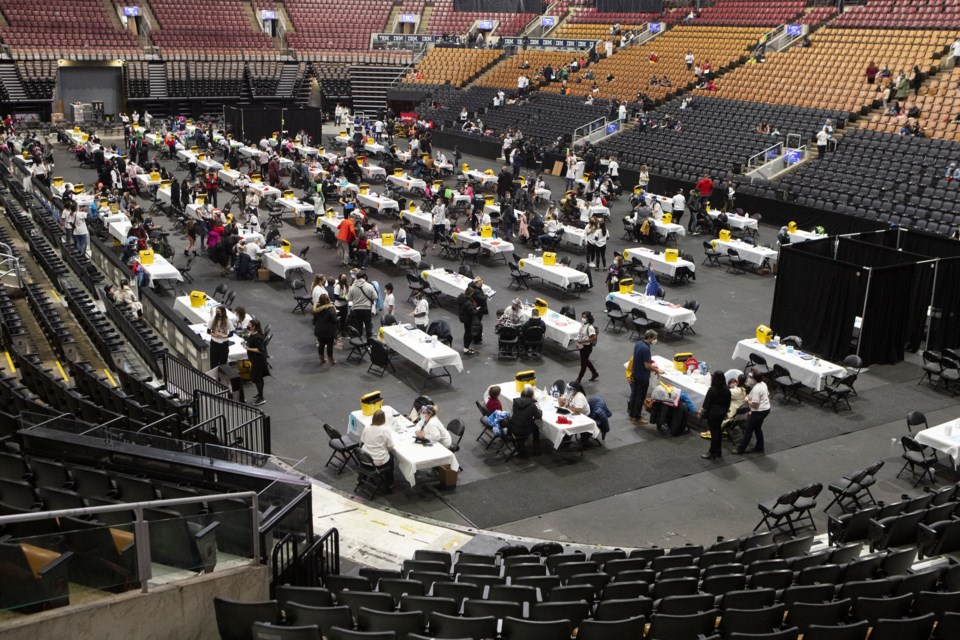Just thinking about her two-year-old getting her first COVID-19 shot is enough to make Katie Gibbs tear up with relief.
More than a year and a half since Canada started doling out COVID-19 jabs, the mother of two in Ottawa says her family still avoids socializing indoors out of concern for its youngest, unimmunized member.
Gibbs is among the many parents who enthusiastically welcomed Thursday's federal approval of a COVID-19 vaccine for kids under five.
"We're really just looking forward to having that peace of mind of knowing that she has some protection," Gibbs said by phone Wednesday. "The protection that everybody else has been eligible for."
But while authorities have endorsed offering Moderna's vaccine to children between the ages of six months and five, some parents aren't convinced that it's worth lining up to give their little ones shots.
Agnieszka Jezyk said she's in no rush to vaccinate her 18-month-old son, noting that she and the toddler caught COVID-19 despite her being fully vaccinated and boosted.
"I just don't think that it's worth it," Jezyk said in a Toronto park Wednesday. "But I think that it's really helpful for people that are suffering from health issues."
The relatively low COVID-19 vaccination rate in younger age groups has raised concerns that challenges may lie ahead in rolling out shots to the youngest Canadians.
Only 56 per cent of kids aged five to 11 have received at least one dose, compared to 85 per cent of the total population, according to federal figures.
"What we've seen is that for the younger age groups, there has been more vaccine hesitancy," Dr. Shelley Deeks, Nova Scotia’s deputy chief medical officer of health, told a news conference Thursday. "We don't know what the uptake is going to be for this age group."
The province is recommending the vaccine, set to roll out in August, and encouraging parents to ask questions of their health-care provider when making immunization decisions for their family, Deeks said.
Dr. Jeff Kwong, a professor of family medicine and public health at the University of Toronto, said he understands that parents only want the best for their children, but a risk-benefit analysis points firmly toward vaccinating them against COVID-19.
"We know the harms of COVID. And we know that these vaccines are effective ... in adults in preventing serious disease," Kwong said Wednesday. "We just want to protect your child from getting severe outcomes."
Kids tend to have milder COVID-19 symptoms, said Kwong, but parents shouldn't write off the risks of infection, which in rare cases can lead to severe illness and hospitalization.
There are also concerns about long-term health impacts, he added, particularly with so much unknown about the effects of repeat infections.
There's no reason to believe that children are any more likely to suffer serious side-effects from the shot, which have been very rare in adults, he said.
Health workers, such as pediatricians and pharmacists, have an important role to play in educating parents about the benefits of vaccination, said Kwong.
But he said he worries some of these trusted providers may lack the time and resources to walk parents through concerns.
"People are tired, and they're overworked," he said. "It takes a lot of effort to educate people."
Science communicator Samantha Yammine said there is also plenty of information on the issue online, cautioning parents to check if the source is credible.
Yammine also reminded people that Canada's drug regulator conducted a rigorous review of Moderna's vaccine application, noting the decision came about a month after the U.S. greenlit the shot.
"I think it's important for parents to know that a lot goes into that decision," she said. "Some parents may have have felt frustrated that our review process took a little longer."
This report by The Canadian Press was first published July 14, 2022.
The Canadian Press



